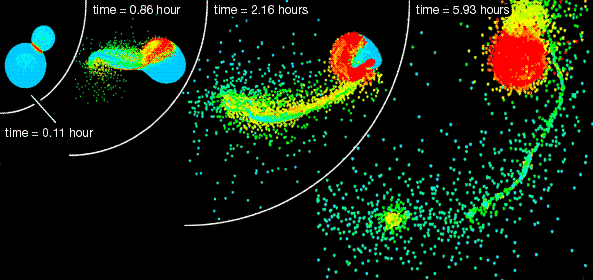I like the answers, but I'm going to give a brief intuitive answer in addition.
Would Jupiter engulf the object and make it stay at Jupiter's core?
reading the other question, which I'm sure you read as well, here I think the safe answer is yes, Earth would be engulfed in Jupiter, though the impact spash would be impressive. I wouldn't want to guess as to exactly what would happen, but it would be, impressive.
Now if it was more of a glancing blow, large chunks of the Earth like planet could pass through and escape, but Jupiter is 10 times the diameter of Earth and quite solid with very high pressure inside. It's hard to see anything short of a Neutron Star passing through that with relative ease. The Jupiter mass rocky planet scenario wouldn't be so much a pass through as a blow up.
As pointed out, the Earth like planet simply approaching Jupiter would begin to break apart.
Would the object get fragmented as when two solid objects hit each
other?
Fragmentation is slowed by gravity. When Earth was hit by Theia - a mars sized planet, at, not sure the velocity but lets say 15-25 KM per second, as it was likely a Trojan orbit, similar to Earth's orbit so the velocity was largely in line, and mostly driven by Earth's and Theia's combined gravitational pull towards each other. If you imagine 2 rocks smashing into each other at 20 times the speed of a bullet, the rocks would pulverize each other, and that's basically what happened with Earth and Theia, you got pulverized planets, a whole lot of heat and the Earth was sent a spinning, but you don't always get debris everywhere cause gravity is a big factor and that can keep a planet together.
This is an Earth-Theia simulation, a glancing blow (a direct hit and more mass would likely have been lost).

And this is probobly a pretty good estimate for an Earth like planet hitting Jupiter. Most of the debris would fall back to jupiter, a share, would have a good chance of forming either a ring (inside the Roche limit) or a moon (outside Jupiter's Roche limit) and a fair bit of matter would fly off and escape Jupiter's gravity given an impact that large. But as a general rule, the larger the planet being hit, the harder it is to blow material into space. Still, a collision this big, I think it would happen.
or what would be the effect?
The Earth, being 1/300th the mass of Jupiter, the crash would change Jupiter's orbit slightly but measurably, by a few tens of MPH and perhaps having a similar smallish effect on it's rotational velocity.
The collision could also be hot enough to make Jupiter glow, probobly enough to be clearly visible to the naked eye. How much - too hard for me to say, but perhaps it would look like a tiny sun but far outshining Venus, perhaps even, approaching the brightness of the full moon for a few hours. The glow might also change with Jupiter's rotation, which takes 10 hours, you could see it grow brighter and dimmer over a 10 hour period for a few days. It would be quite the show through a telescope, assuming it wouldn't be too bright, but you could watch the debris cloud take shape over several hours and perhaps form into a new moon in a few days.
Finally, another effect would likely be debris, even if it's mostly hydrogen, scattered around the solar system. If Jupiter was rocky, it would be far worse for us, as you'd likely get some enormous meteor showers in a few years and perhaps a few major meteor impacts (for example, if this happened on Mars, it would be quite bad for us), but Jupiter's more gaseous composition, I don't think that would be the case. The new dust clouds would be more curiosities than things to worry about.
It's worth pointing out that an earth sized object simply passing through the solar system could be quite problematic, not affecting the planets too much, but stirring up Kuiper belt objects or asteroids in the asteroid belt and sending them every which way, perhaps a few towards Earth - not a good situation for us, but that kind of new object passing through happens very rarely.
